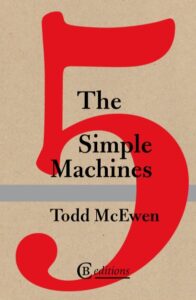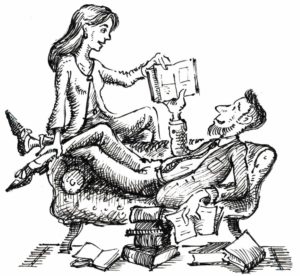Harry Worth Meets Little & Little
I WAS ASKED recently what were the funniest books, recently published, that I’ve read. I don’t read much modern fiction and suppose I am too old to find too many books published now to be that funny. (I am of the era that read Lucky Jim and found The Men from the Ministry and Harry Worth a hoot, both shows had music written by Ivor Slaney, both pieces all but identical.) But two books immediately sprang to mind: Spurious by Lars Iyer and The 5 Simple Machines by Todd McEwen. Both are quite short books; both are a bit clever (if still in the 1960s, we can say likely to have been screened by the BBC rather than ITV).
 Lars Iyer is a former professional philosopher (a Wittgenstein specialist – that isn’t a good opening line to use if on a date), though now he teaches creative writing, a much misunderstood academic discipline, designed especially for the hapless, the dole queue avoidant, and those late out of their beds each morning (although they do, at least, I hope, perform that act with their verbs well declined). Spurious was Iyer’s debut novel, published in 2011 by Melville House. It is the first part of a trilogy of books, a humourous riffed work of wonder that will have you giggling like you were sat in the back row at school. The next volumes were Dogma and Exodus, books that galloped rather than cantered. They read as a modern sitcom, where character is the focus rather than the script or plot. So the books are riddled with in-jokes, catch phrase lines rather like the comic leitmotifs of a TV sitcom. The writing relies on timing and repetition more than any other construct, and, if bewildered at times by its detail, we realize that we are on the ‘outside’, non-participatory and bemused: this book is like a photo album stuffed with somebody else’s holiday snap shots, each one an alien experience, and a hoot: trust me, you will enjoy it.
Lars Iyer is a former professional philosopher (a Wittgenstein specialist – that isn’t a good opening line to use if on a date), though now he teaches creative writing, a much misunderstood academic discipline, designed especially for the hapless, the dole queue avoidant, and those late out of their beds each morning (although they do, at least, I hope, perform that act with their verbs well declined). Spurious was Iyer’s debut novel, published in 2011 by Melville House. It is the first part of a trilogy of books, a humourous riffed work of wonder that will have you giggling like you were sat in the back row at school. The next volumes were Dogma and Exodus, books that galloped rather than cantered. They read as a modern sitcom, where character is the focus rather than the script or plot. So the books are riddled with in-jokes, catch phrase lines rather like the comic leitmotifs of a TV sitcom. The writing relies on timing and repetition more than any other construct, and, if bewildered at times by its detail, we realize that we are on the ‘outside’, non-participatory and bemused: this book is like a photo album stuffed with somebody else’s holiday snap shots, each one an alien experience, and a hoot: trust me, you will enjoy it.
 Todd McEwen’s The 5 Simple Machines was published in 2013 by CB editions, a publisher currently in retirement, sadly so because it has been the most wonderful poetry press and the most enterprising of smaller British publishers (it has personality, immaculate style, and, above all, a voice and a soul). The novel is brilliance. I have to say that you do get the gag in the end, and it might be a bit tiresome to have ‘dik’ jokes recounted over 145 pages. It is, however, a tour de force, stuffed full of friction and compulsion, rather like the masturbatory act. It is broken up in to six separate tales, each a variation on an aspect of the sexual act, so delicate and refined is the language that it is a variation in the deft style of Mozart and not the heavy-handed Busoni, even if we do find out just how large is Bishop Staunton’s penis. Each chapter refers hilariously to the “six so-called mechanical powers – the lever, the wedge, wheel and axle, pulley, screw and inclined plane,” although the titles account for only five because, technically speaking, the wedge is only an application of the inclined plane, and we are told why. This book ripples with smart humour, its perspective and style clean and classical, and the author does in fact know exactly how long to run with each gag, riposte or observation (then it’s probable that he’s good at sex, too).
Todd McEwen’s The 5 Simple Machines was published in 2013 by CB editions, a publisher currently in retirement, sadly so because it has been the most wonderful poetry press and the most enterprising of smaller British publishers (it has personality, immaculate style, and, above all, a voice and a soul). The novel is brilliance. I have to say that you do get the gag in the end, and it might be a bit tiresome to have ‘dik’ jokes recounted over 145 pages. It is, however, a tour de force, stuffed full of friction and compulsion, rather like the masturbatory act. It is broken up in to six separate tales, each a variation on an aspect of the sexual act, so delicate and refined is the language that it is a variation in the deft style of Mozart and not the heavy-handed Busoni, even if we do find out just how large is Bishop Staunton’s penis. Each chapter refers hilariously to the “six so-called mechanical powers – the lever, the wedge, wheel and axle, pulley, screw and inclined plane,” although the titles account for only five because, technically speaking, the wedge is only an application of the inclined plane, and we are told why. This book ripples with smart humour, its perspective and style clean and classical, and the author does in fact know exactly how long to run with each gag, riposte or observation (then it’s probable that he’s good at sex, too).






